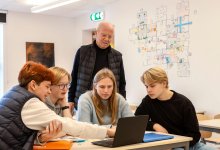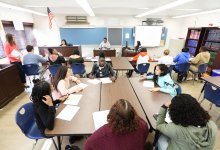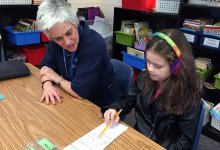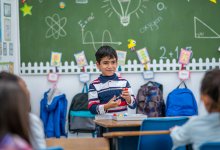Project-Based Learning (PBL)
Project-based learning is a dynamic classroom approach in which students actively explore real-world problems and challenges and acquire transferable knowledge.
Nurturing Changemakers With an ELA Project
One way to help students master skills is to let them cultivate their own English language arts content to explore. Here’s how.371Using PBL in Environmental Science Class
Project-based learning and an apprenticeship model helped garner community support when students decided to open a rural county’s first recycling center.An Interdisciplinary Approach to Teaching Climate Change
Combining several content areas can guide students to develop a deep understanding of how climate change affects them and their community.226A Handy Framework for Designing Units of Study
People, places, and problems offer rich opportunities for real-world learning. This unit design framework ensures engaging, aligned learning objectives, experiences, and assessments.4144 Strategies for Building Content Knowledge
Elementary students need rich content knowledge to become better readers and to be able to engage in project-based learning.1.1kDesigning Science Inquiry: Claim + Evidence + Reasoning = Explanation
The Claim, Evidence, Reasoning framework is a scaffolded way to teach the scientific method.27.2kInquiry-Based Tasks in Social Studies
Assignments that are bigger than a lesson and smaller than a unit are a good way to experiment with inquiry-based learning.10.2kPreparing Students for PBL Presentations
Project-based learning often culminates in a presentation for an audience beyond the classroom, and students need a lot of practice to be successful.643Using Culturally Responsive Project-Based Learning to Teach Core Skills
One school used a PBL unit that combined science, math, and cooking dumplings to explore the many cultures that make up their community.1.4kHaving Students Learn by Teaching
When high school students present a lesson, they actively engage in learning and grow their research, organizational, and speaking skills.1.4k6 Strategies for Differentiated Instruction in Project-Based Learning
Reflecting on learning and student voice and choice are core elements of project-based learning, and they’re also key to differentiation.13.5k5 Steps to Keep Engagement High During Project-Based Learning
Taking students’ interests into account when designing project-based learning helps ensure that they stay engaged throughout the unit.770Want to Improve Education? Ask Students for Input
High school students have good ideas about how school can better serve learners, as the winners of a national challenge show.201Exploring Social Justice Issues Through PBL
The open-ended work in project-based learning can help students explore issues that matter to them.4.4kThe Benefits of Presenting Preschool PBL Work
Project-based learning allows very young students to explore, research, and grow their knowledge. Presenting their work to the community validates their efforts.401













